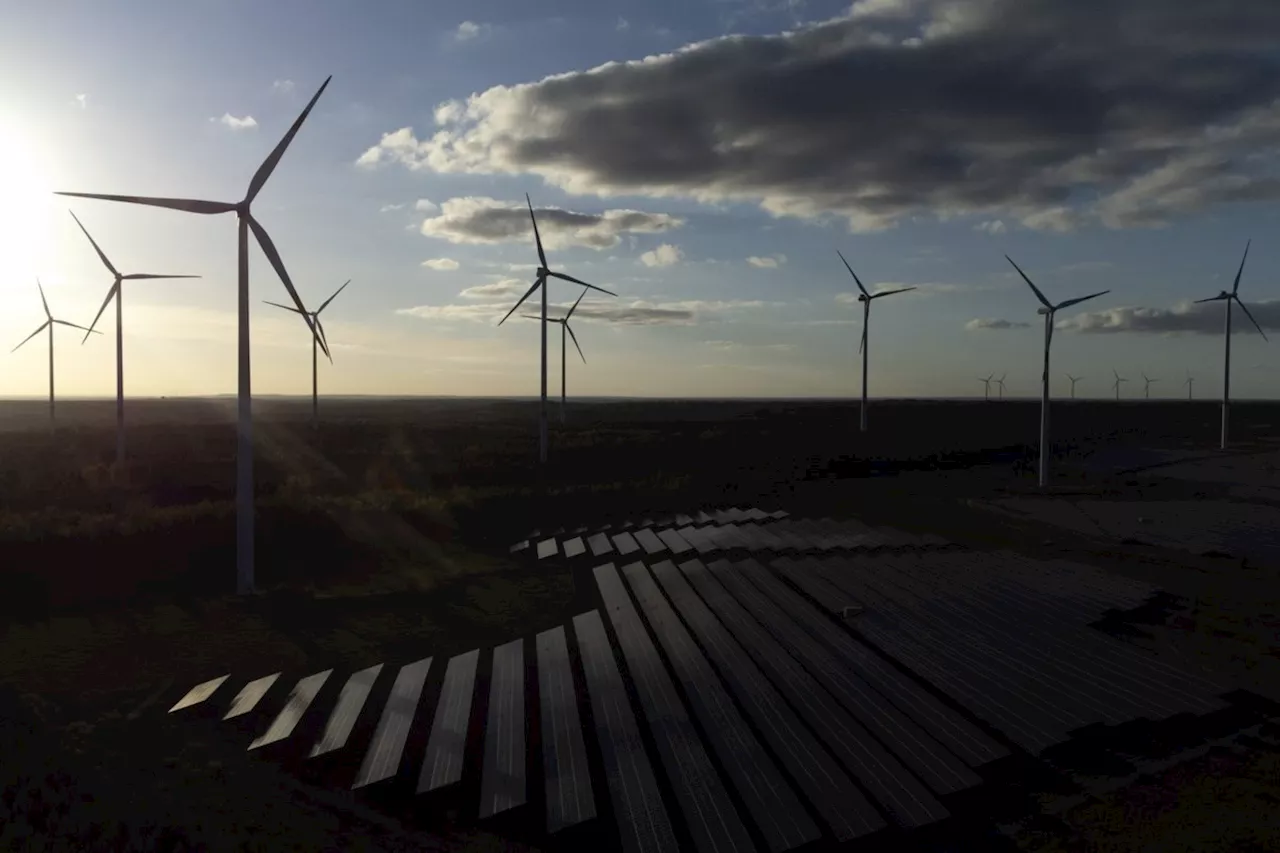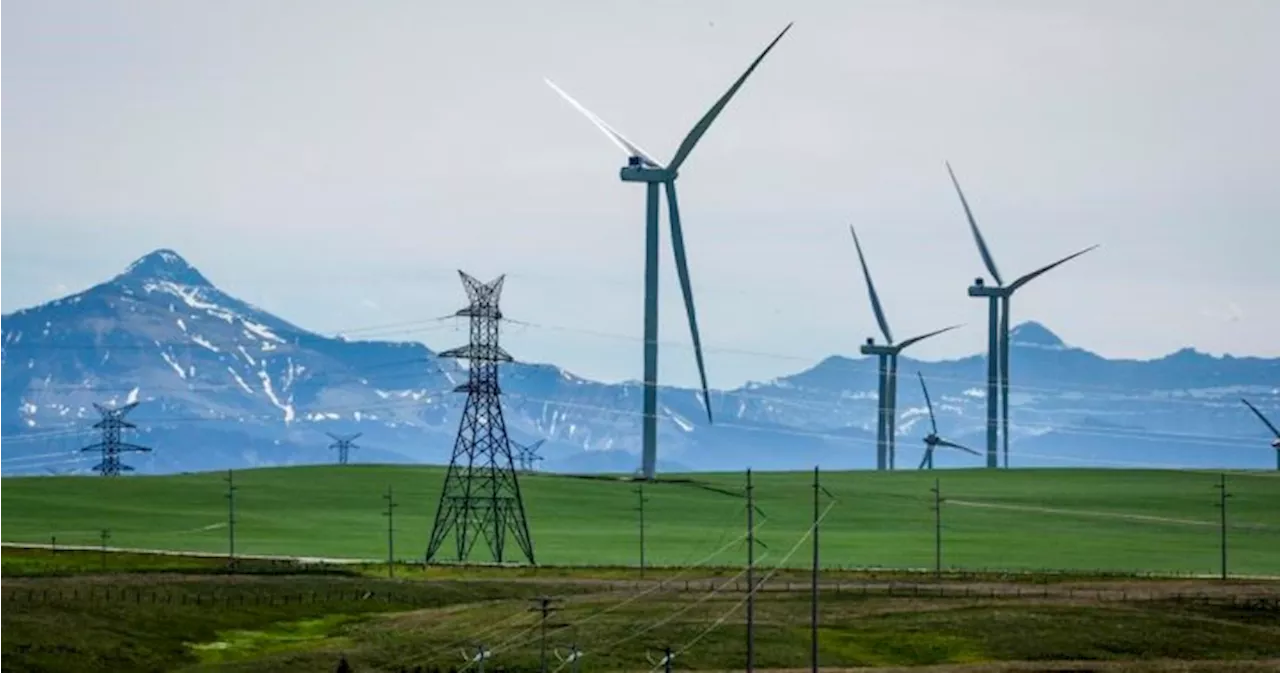British Columbia's energy minister emphasizes the need for greater energy independence as President Trump threatens tariffs on Canadian goods. The signing of a purchase agreement for electricity from a wind project owned by the Saulteau First Nations is highlighted as a step towards achieving this goal. The province faces challenges meeting future electricity demand due to population growth and reliance on neighboring utilities.
VANCOUVER — The looming prospect of American tariffs raises the stakes for boosting the province's energy independence, British Columbia Energy Minister Adrian Dix said Thursday.
The Saulteau First Nations hold a 51 per cent economic interest in the Taylor Wind project, which is expected to produce enough electricity to power about 60,000 homes. "Of course, energy is part of that. We're going to support our industry here, and we're going to the learn the lesson of this, I think, which is the absolute need to diversify."
B.C. has been a net importer of electricity over the last two years, he noted, with the purchase of about 20 per cent of its power in 2023 and 2024.
ENERGY INDEPENDENCE TARIFFS RENEWABLE ENERGY BC HYDRO ENERGY SECURITY
Canada Latest News, Canada Headlines
Similar News:You can also read news stories similar to this one that we have collected from other news sources.
 B.C. Energy Minister Highlights Need for Independence Amid Tariff ThreatsBritish Columbia Energy Minister Adrian Dix emphasizes the urgency of achieving energy independence for the province in light of the threat of American tariffs on Canadian goods. Dix announces a new purchase agreement with the Saulteau First Nations for a 200-megawatt wind project, highlighting the province's commitment to renewable energy development and energy security.
B.C. Energy Minister Highlights Need for Independence Amid Tariff ThreatsBritish Columbia Energy Minister Adrian Dix emphasizes the urgency of achieving energy independence for the province in light of the threat of American tariffs on Canadian goods. Dix announces a new purchase agreement with the Saulteau First Nations for a 200-megawatt wind project, highlighting the province's commitment to renewable energy development and energy security.
Read more »
 Energy minister makes the case for U.S.-Canada energy alliance in WashingtonWASHINGTON — Energy and Natural Resources Minister Jonathan Wilkinson — the latest Liberal to visit Washington in response to president-elect Donald Trump’s tariff threats — is making a pitch for a Canada-U.S. energy and resource alliance.
Energy minister makes the case for U.S.-Canada energy alliance in WashingtonWASHINGTON — Energy and Natural Resources Minister Jonathan Wilkinson — the latest Liberal to visit Washington in response to president-elect Donald Trump’s tariff threats — is making a pitch for a Canada-U.S. energy and resource alliance.
Read more »
 Russia Intensifies Attacks on Ukraine's Energy Infrastructure in WinterRussia continues to assault Ukraine's energy systems, targeting gas infrastructure and power facilities in the west. This escalation aims to disrupt Ukraine's energy supply during winter. Ukrainian officials report successful interceptions of missiles and drones but acknowledge damage to energy facilities. The attacks coincide with heightened diplomatic efforts, including prisoner exchanges and discussions on bolstering Ukraine's air defense.
Russia Intensifies Attacks on Ukraine's Energy Infrastructure in WinterRussia continues to assault Ukraine's energy systems, targeting gas infrastructure and power facilities in the west. This escalation aims to disrupt Ukraine's energy supply during winter. Ukrainian officials report successful interceptions of missiles and drones but acknowledge damage to energy facilities. The attacks coincide with heightened diplomatic efforts, including prisoner exchanges and discussions on bolstering Ukraine's air defense.
Read more »
 Ontario Nuclear Power Plant: A Gateway to Expanded Energy Production?Ontario's plan to build a new nuclear power plant in Port Hope has experts speculating about a potential wave of nuclear energy development in the province. The project aims to address Ontario's growing energy needs while promoting clean energy solutions.
Ontario Nuclear Power Plant: A Gateway to Expanded Energy Production?Ontario's plan to build a new nuclear power plant in Port Hope has experts speculating about a potential wave of nuclear energy development in the province. The project aims to address Ontario's growing energy needs while promoting clean energy solutions.
Read more »
 EU Reaches Record 47% Clean Energy, Outpacing US ShiftThe European Union has hit a new milestone in its clean energy transition, with renewables providing a record 47% of the bloc's electricity. This surge in renewable energy contrasts with the United States' focus on fossil fuels under the new administration. Experts highlight Europe's progress as a sign of its commitment to climate action and energy independence.
EU Reaches Record 47% Clean Energy, Outpacing US ShiftThe European Union has hit a new milestone in its clean energy transition, with renewables providing a record 47% of the bloc's electricity. This surge in renewable energy contrasts with the United States' focus on fossil fuels under the new administration. Experts highlight Europe's progress as a sign of its commitment to climate action and energy independence.
Read more »
 B.C. Races to Boost Power Production Amid Rising Demand and Renewable Energy GoalsBritish Columbia is facing an energy crisis as demand for electricity outstrips its current production capacity. The province is increasingly reliant on imports from neighboring provinces, often generated with fossil fuels, raising concerns about energy security. To address this challenge, the B.C. government is aggressively pursuing renewable energy projects, with recent agreements for wind power developments. However, experts warn that the province still needs to significantly increase its clean energy capacity to meet future demands driven by population growth, housing construction, and the shift away from fossil fuels.
B.C. Races to Boost Power Production Amid Rising Demand and Renewable Energy GoalsBritish Columbia is facing an energy crisis as demand for electricity outstrips its current production capacity. The province is increasingly reliant on imports from neighboring provinces, often generated with fossil fuels, raising concerns about energy security. To address this challenge, the B.C. government is aggressively pursuing renewable energy projects, with recent agreements for wind power developments. However, experts warn that the province still needs to significantly increase its clean energy capacity to meet future demands driven by population growth, housing construction, and the shift away from fossil fuels.
Read more »
